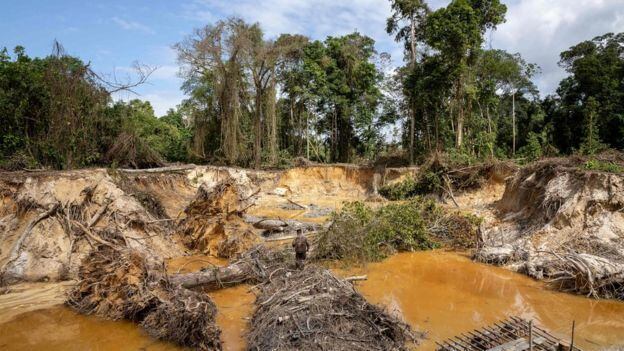
The use of mercury in mining and its trafficking to Peru, Brazil and Colombia, where it is prohibited, has earned Bolivia strong questioning by the United Nations (UN) and the Organization of American States (OAS), who have called on the Bolivian authorities to honor international commitments.
“We see with great concern not a reduction (in the use of mercury) but an increase in smuggling, which undermines the commitments of the Bolivian State and the efforts of other countries in the Amazon basin”, said the UN Special Rapporteur for Toxic Substances Marcos Orellana during a virtual hearing held between Monday and Tuesday with the Inter-American Commission on Human Rights (IACHR) at the request of Bolivian civil society organizations.
In said hearing, the IACHR demanded explanations from the Bolivian government about “the measures it is taking and “The reasons for the increase in the importation of mercury, which has quadrupled in the last decade”, said IACHR commissioner Joel Hernández. “It is not a question of preventing mining but of seeking that it be conducted according to principles of sustainable development.”
Mercury is toxic to health and the environment. Its use and trade are prohibited in most of the 140 countries that signed the Minamata Convention in 2013, including Bolivia. It is used to separate and extract gold from stones and is widely used by artisanal mining and more recently by companies that operate huge dredges in rivers and nature reserves in the Bolivian Amazon.
“The use of mercury is worrying, but it is very difficult to replace it. There are tasks that we must carry out.” Fausto Vélez, director of the Environment of the Bolivian Ministry of Mining, said at the audience.. “Licenses to operate have been rejected. The use above all occurs in illegal mining and there are no studies as it is an illegal activity”, explained the Deputy Minister of the Environment, Magín Herrera.
The IACHR recalled that there are three months left for Bolivia to approve an action plan with “measures and deadlines” to honor the covenant. Herrera said that one “critical path takes two years but “We hope to implement it next year.”
On behalf of civil society, researcher Oscar Campanini questioned the fact that Bolivia is among the main importers of mercury in the world with 192 tons per year when its requirement is 60 tons and that the State has not approved an action plan to curb its use. and trade. There are claims from activists that the surplus is smuggled into Peru, Brazil and Colombia, where it is banned.
Colombian researcher Jesús Olivero said that monitoring studies found “worrying results” of mercury concentrations above normal in indigenous populations of the Beni River, in northeastern Bolivia, whose diet is based on the consumption of fish. The IACHR has requested more specific studies.
“Extractivism, deforestation and mining have intensified with the total exclusion of indigenous peoples to favor economic and political interest groups”, denounced the indigenous leader Ruth Alípaz.
Source: Gestion
Ricardo is a renowned author and journalist, known for his exceptional writing on top-news stories. He currently works as a writer at the 247 News Agency, where he is known for his ability to deliver breaking news and insightful analysis on the most pressing issues of the day.











